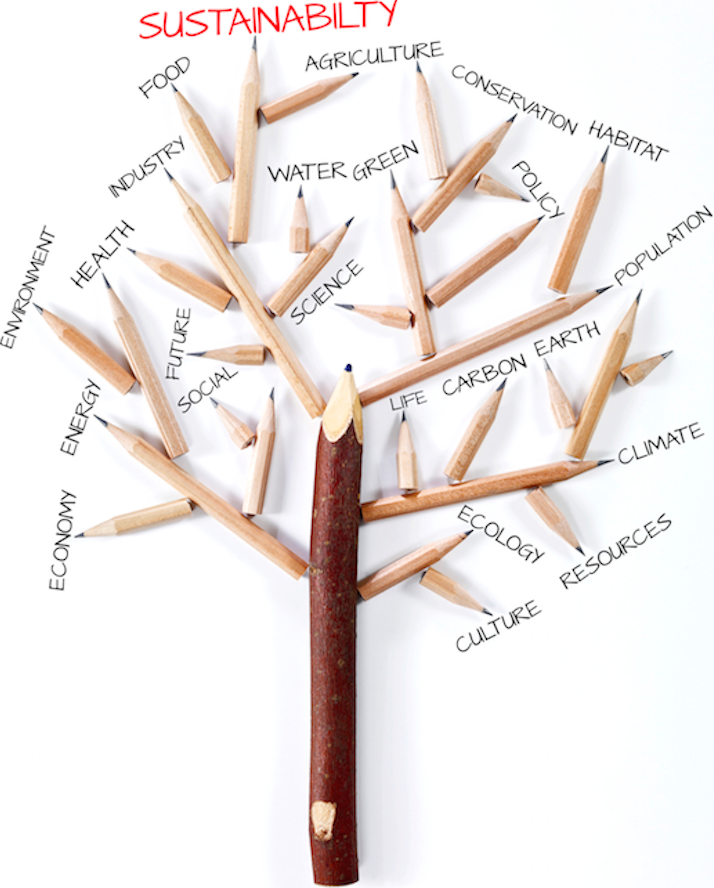By Christian Petroske
This sounds like a riddle: why would Coca Cola, one of the biggest soft drinks companies in the world, be investing in a cause to empower five million female entrepreneurs globally by 2020?
But it’s true:1 the Coca Cola Company’s initiative, called 5by20, is a forerunning example of a trend sweeping the corporate world. This trend is known by many names, the foremost of which are “shared value”, “inclusive business” or “sustainable business”. Their definitions can seem murky at first, but these terms share a common thread. They sit at the intersection of economy and society, one that could reshape business' role in humanity's future.
Their meaning holds the key to our first question: why would Coca Cola sink so much into such an ambitious corporate social responsibility (CSR) goal?2
The short answer is that Coca Cola found out that their biggest sellers, especially in developing markets, are women who own and operate small-scale neighbourhood markets and grocery stores. Often, these ladies start out of their own homes. Recognising this, the company saw an opportunity— if they could educate these very women in enterprise skills, they could sell more Coca Cola products. The organisation could increase its profits by investing in the feel-good cause of women’s empowerment. That is the essence of inclusive business: making money by addressing poverty, and by including those who have been excluded by the mainstream market. In other words, it is business to expand access to goods, services, and livelihood opportunities for low-income communities in commercially viable ways.
Although Coca Cola’s initiative may seem like a win-win strategy, thinking in this way about business and its potential is entirely foreign to many mainstream corporate leaders. As some commentators believe, this is especially true in Asia. Perhaps due to the vagueness of the terms involved—couldn’t “shared value” mean almost anything?—or the fact that it can be tricky to execute, businesses have not taken up the mantle in the way that Coca Cola and some other companies have to bring economic empowerment to the poor while also reaping more profits.
What, then, could be holding organisations back? To answer this, let us first examine the history of business’ attitude towards society in general, which has been much influenced by the sentiments perhaps best championed by Nobel- Prize-winning economist Milton Friedman. Back in 1970, Friedman argued in a famous article that business’ sole social responsibility was to increase profits.3 Businesses that work towards social and environmental goals would be doing society a disservice, he claimed, because these commitments would constrain them from perfect profit maximisation and prevent markets from operating as smoothly and freely as he thought they should. As a result, not only have many organisations bought fully into the profit maximisation gospel, public companies also seek to maximise shareholder returns on a short-term quarterly basis.
Forty years after Friedman’s paper, Michael E. Porter and Mark R. Kramer declared in their seminal piece4 that “the capitalist system is under siege”, and that businesses have lost the trust of society because they have been “trapped in an outdated approach to value creation”. For examples to support Porter and Kramer’s claims, one need look no further than the Rana Plaza factory collapse in Bangladesh,5 which put multinational fashion brands Primark and Loblaw under fire; Uber’s ongoing crisis;6 or that of United Airlines.7
These are costly failures resulting from poor management of some factors—typically ignored as “externalities”—that have since been recognised as core to long-term business viability. Business leaders are beginning to realise that among the factors crucially important for long-term success are brand reputation, social licence to operate, value chain integrity, and the social, environmental and political impacts of product and service decisions.8 On the other hand, focusing only on quarter-by-quarter returns, as it turns out, appears to be a recipe for creating deadly medium- and long-term risk.9

The world is changing and even the most stubborn organisations are starting to recognise the need to change with it. Consumers and investors have more transparency into what companies do and the consequences of their actions; younger workers are facing a more mobile and transparent working environment, so they are enabled to move between jobs more easily; and these same younger workers are increasingly prioritising meaning10 and flexibility in their work lives alongside money. Additionally, a recent Edelman study showed that consumers are losing trust in institutions of all kinds, including businesses.11 With the way things are currently going, companies may decide that they cannot afford to look just at short-term profit maximisation if they want to recruit and retain talent, reach and maintain a customer base, keep investors happy, innovate and expand.
Not only that, but according to CSR Asia founder and Chairman Richard Welford, “there is now an overwhelming business case for sustainability and CSR, and it’s been proven through three or four hundred published articles in business and academic journals that show the link between sustainability and the bottom line in various ways.” Indeed, there is a formidable body of research12 on the topic. FMCG giant Unilever has found that its sustainable brands are growing at an average of 50 per cent more quickly13 than its other brands. Further, a recent report by the Sustainable Business Commission has calculated that sustainable business models will constitute a US$5 trillion opportunity in Asia alone by 2030.14
So how can businesses carve out a piece of this pie? In the same Sustainable Business Commission report,15 the authors identified the 60 biggest market opportunities related to delivering on the 2030 Sustainable Development Goals (SDGs).16 Opportunities range from serving low-income food markets to providing better maternal and child health. There are also websites such as sharedvalue.org and Project Breakthrough (http://breakthrough.unglobalcompact.org) dedicated wholly to sharing successful case studies of businesses focused on the SDGs.
However, there are some real challenges ahead; for example, in trusting businesses to do what their high-flown language seems to indicate. After all, it is easy to say the right things and use the new terminology of “shared value” or “inclusive business”, without actually changing the core business or making serious investments.
On this point, Eugene Tan, Associate Professor of Law at the Singapore Management University, says, “We also need to distinguish between form and substance”. Tan adds that he does “not see a clear trend of more companies in Asia using their core business to drive social and environmental impact, in addition to profit”, citing Singapore as “a good example where companies say the ‘right’ things but when you look closely at whether they have changed their way of doing business that accords similar importance to socio-environmental impact and profits, the gap between talk and practice is evident and worrying.”
Tan goes on to stress that without pressure from consumers, there is unlikely to be pressure from investors—and if investors or consumers view CSR merely as a nice-to-have, there will not be meaningful change. He mentions how brands like Panasonic are using terms like “shared value” even when their practices amount to “more of the same, traditional CSR”. Tan notes, however, that while some corporations, especially in China, Korea and Japan, are leading the way in terms of socially inclusive business strategy, the vast majority of the Asian business world has yet to catch up.
This begs the question: exactly how is traditional CSR different from inclusive business and shared value? According to Mark Kramer, FSG’s co-founder and Managing Director, they are overlapping.17 However, CSR is “widely perceived as a cost center, not a profit center”, whereas shared value refers to “business opportunities that create new markets, improve profitability, and strengthen competitive positioning”.18
Essentially, CSR is nice, but often viewed by organisations as something extra or peripheral to the core business—when a company gets into trouble, CSR is the first to go. On the other hand, shared value—and by extension, inclusive business—gives companies “skin in the game”. Businesses have more of a stake in these initiatives because they are not just nice-to-haves, but strategies to reach long-term growth and profit goals.
In recent years, a few other organisations, besides Coca Cola, seem to be growing initiatives that accomplish the SDGs while growing their bottom lines. One example is Cisco: their Cisco Networking Academy claims to train as many as one million people per year in IT skills. The result? According to the company, in Cambodia alone, 80 per cent of graduates of their programme found work within three months of graduation and made five times the national average within three years.19 Like Coca Cola’s programme, Cisco’s not only goes beyond checking traditional CSR boxes, but also aligns with business goals—the organisation needs an IT-literate workforce in order to expand into developing economies.
And then there is the CJ Group, a South Korean conglomerate, that helps to address poverty and increase incomes among smallholder farmers in Vietnam, while increasing the sustainable supply of chilli peppers for CJ’s food businesses. Another example is Olam, a Singapore-based company that became a leader in specialty coffee by reforesting and conserving forests around its bean production facilities.20 Not forgetting Enel Group, a multinational manufacturer and distributor of electricity and gas, which has gone even further by declaring its intention to be fully carbon-neutral by 2050.21
Welford sees more companies following in their footsteps and continuing to push the envelope. In fact, he asserts that “the future success of business depends on having a very clear social purpose”. Following Porter and Kramer, Welford believes not only that businesses will increasingly integrate their CSR within their core business, but that the two will become indistinguishable to the point that “companies that don’t have a social purpose will not exist in the future”.
Will businesses across Asia more fully embrace inclusive business and shared value, not just in talk but also in action? If consumers and investors— the key stakeholders in any business—remain uninterested in getting onboard, then prospects may remain bleak for a while. However, the clock is ticking: to meet the Sustainable Development Goals by 2030, there are serious commitments. And if the forecasts of climate scientists the world over are any indication, we are running out of time to take action to avert unprecedented global catastrophe.22 The consensus is that businesses have a huge role to play, though it remains to be seen if they—especially those in certain parts of Asia—will step up and seize the trillion-dollar opportunities in good time.
Notes
1 Beth Jenkins, Kara Valikai and Piya Baptista, The Coca-Cola Company’s 5by20 Initiative Empowering Women Entrepreneurs across the Value Chain (Cambridge, MA: CSR Initiative at the Harvard Kennedy School and Business Fights Poverty, 2013).
2 World Business Council for Sustainable Development, “About Inclusive Business”, at http://www.inclusive-business.org/inclusive-business.html
3 Milton Friedman, “The Social Responsibility of Business Is to Increase Its Profits”, The New York Times Magazine, 13 September 1970.
4 Michael E. Porter and Mark R. Kramer, “Creating Shared Value: How to Reinvent Capitalism—And Unleash a Wave of Innovation and Growth”, Harvard Business Review (January–February 2011), at https://myhbp.org/leadingedge/d/cla&c=24811&i=25967&cs=e3c4e5ddc7e9cb91d18872a098ee63b6
5 The Economist, “Disaster at Rana Plaza”, The Economist, 4 May 2013, at https://www.economist.com/news/leaders/21577067-gruesome-accident-should-make-all-bosses-thinkharder- about-what-behaving-responsibly
6 Sam Shead, “UBER in Crisis: How a String of High-Profile Problems Led to Uber’s Worst Possible Start to 2017”, Business Insider, 20 March 2017, at http://www.businessinsider.com/uber-in-crisis-timeline-2017-3/?IR=T
7 Alanna Petroff, “United Airlines Shows How to Make a PR Crisis a Total Disaster”, CNN, 11 April 2017, at http://money.cnn.com/2017/04/11/news/united-passenger-pr-disaster/index.html
8 Tensie Whelan and Carly Fink,"The Comprehensive Business Case for Sustainability", Harvard Business Review, 21 October 2016, at https://hbr.org/2016/10/the-comprehensive-business-casefor-sustainability
9 Sean Silverthorne, “The High Risks of Short-Term Management”, Harvard Business School Working Knowledge, 11 April 2012, at http://hbswk.hbs.edu/item/the-high-risks-of-short-termmanagement
10 Stephanie Turner, “Analysis: The Millennial Majority Is Transforming Your Culture”, Deloitte.com, at https://www2.deloitte.com/us/en/pages/about-deloitte/articles/millennialmajority- transforming-culture.html
11 Edelman, “2017 Edelman TRUST BAROMETER Reveals Global Implosion of Trust: CEO Credibility at Lowest Level Ever”, Edelman.com, 15 January 2017, at http://www.edelman.com/ news/2017-edelman-trust-barometer-reveals-global-implosion
12 Archie B. Carroll and Kareem M. Shabana, “The Business Case for Corporate Social Responsibility: A Review of Concepts, Research and Practice”, International Journal of Management Reviews 12, 1 (March 2010): 85–105, at http://onlinelibrary.wiley.com/ doi/10.1111/j.1468-2370.2009.00275.x/full
13 Leonie Roderick, “Unilever’s Sustainable Brands Grow 50% Faster Than the Rest of the Business”, Marketing Week, 18 May 2017, at https://www.marketingweek.com/2017/05/18/unilever-sustainable-brands-growth
14 Business Commission, “Sustainable Businesses Can Unlock US$5 Trillion in New Market Value in Asia by 2030”, BusinessCommission.com, 5 June 2017, at http://businesscommission.org/ news/sustainable-businesses-can-unlock-us-5-trillion-in-new-market-value-in-asia-by-2030
15 Ibid.
16 United Nations, “Sustainable Development Goals: 17 Goals to Transform Our World”, UN.org, at http://www.un.org/sustainabledevelopment/sustainable-development-goals
17 Mark Kramer, “CSR vs. CSV—What’s the Difference?”, FSG.org, 18 February 2011, at http://www.fsg.org/blog/csr-vs-csv-what%E2%80%99s-difference
18 Ibid.
19 CISCO, “Case Study: Passerelles Numériques Cambodia—Changing the Cycle of Poverty into a Cycle of Success”, CSR.CISCO.com, at http://csr.cisco.com/casestudy/networking-academycambodia
20 CSR Asia, Agribusiness in ASEAN: Making the Case for Smallholder Inclusion—An Analysis of Ten Agricultural Private Sector Actors Who Have Adopted Responsible and Inclusive Approaches to Smallholder Producers (UK, Hong Kong and Sweden: Oxfam, CSR Asia and Swedish International Development Cooperation Agency, 2017), at http://www.csr-asia.com/report/GRAISEA_Smallholder_Case_Studies_2017.pdf
21 Enel, “Climate Strategy”, in Sustainability Report 2015, Enel.com, at http://sustainabilityreport2015.enel.com/en/responsible-management-business/environment/climate-strategy#start
22 David Wallace-Wells, “The Uninhabitable Earth: Famine, Economic Collapse, a Sun That Cooks Us: What Climate Change Could Wreak—Sooner Than You Think”, New York Magazine, 9 July 2017, at http://nymag.com/daily/intelligencer/2017/07/climate-change-earth-too-hot-forhumans. html
 |
Christian Petroske is focused on unlocking business’s purpose as an engine for just and sustainable societies. Previously, he was an Assistant Manager at the Lien Centre for Social Innovation, where he drove a diverse range of projects, including the Centre’s capacity-building programmes, courses, and events, and served as Contributing Editor to Social Space. During this time, he helped launch the inaugural batch of the SMU Impact Accelerator, an accelerator programme for social entrepreneurs. Prior to LCSI, Christian helped Year Up build data-based feedback loops into its core decision-making as Sales Operations and Market Research Fellow, while participating in a selective, applied management training programme through New Sector Alliance’s Residency in Social Enterprise. Christian holds a BA in Sociology with Honours from Brown University, where he wrote an award-winning Honours thesis on feedback and power in social finance. He can be reached at hi@christianpetroske.com |








Comments